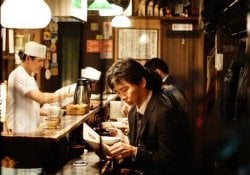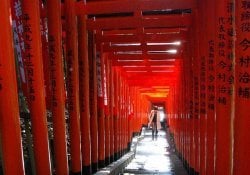Today we are going to know the different ways to say “but” in Japanese. You can say “but” using the particle ga [が], kedo [けど], demo [でも] shikashi [しかし], tadashi [ただし] and others. But there was always the question of which one to use. They will be answered with some examples and explanations in this article.
Índice de Conteúdo
Untranslatable
This is one of the most well-known and used forms, usually used at the beginning of the sentence, but it can never appear at the end and in the middle of a sentence like kedo (けど) and others. Demo is used for more colloquial tones, a more formal way of saying "but" at the beginning of the sentence is Shikashi (しかし).
Examples:
- 友達の家に行くつもりでした。 でも、彼女は病気です。
- I was planning to go to my friend's house. However, she is sick;
- I was going to a friend's house. But, she is sick;
- 今日、学校に行きません。でも明日行きます
- Today, I'm not going to school. But I'll go tomorrow.
- Today I don't go to school, but tomorrow I go;
- 私はあなたがすき。でも、君はバカです
- Watashi wa anata ga suki. But, you are a fool.
- I love you. But you are an idiot.
- でも、あなたにあげるりんごはありません
- Demo, anata ni ageru ringo wa arimasen
- But I have no apples to give you;
Kedo or Keredomo (けど or けれども)
Kedo can mean: but, however or despite everything. Unlike でも, けど is used between clauses to make a compound sentence, creating opposite sentences. There are some degrees of formality which are:
- However quite formal
- Keredo (けれど) = Formal, but not so much
- Kedo (けど) = Informal
Usage examples:
- 頼まれた仕事は終わりましたけど、部品が一個足りなかった。
- Tanomareta shigoto wa owarimashitakedo, buhin ga ichi-ko tarinakatta;
- I finished the service they asked me to do, but one piece was missing;
- 彼はあまり勉強しないけれども、成績がいい
- Kare wa amari benkyō shinaikeredomo, seiseki gaii
- He doesn't study much, but he gets good grades.
When a sentence ends with nouns and adjectives like AT, it is necessary to put the verb "To be" in the simple form (da - だ) before the けど, thus transforming it into だけど。Examples:
- ケビンは先生だけれども、教えるのが嫌いです。
- Kebin is a teacher but he hates teaching.
- Kevin is a teacher, but he doesn't like to teach;
- 友達はたくさんいるんだけど、 なんか寂しい。
- Tomodachi wa takusan irun dakedo, nanka sabishii;
- I have many friends, but I feel lonely;
Shikashi (しかし) and Tadashi [ただし]
Shikashi also means “but” or “however”, but it is more formal and has a stronger impact than でも. The shikashi is most commonly used in official or written speeches. [しかし] has a similar meaning to [けれども] but is used at the beginning of sentences.
let's see some examples:
- しかし今や事態は大きく変わった
- Shikashi imaya jitai wa ōkiku kawatta;
- But now the situation has changed a lot;
- しかし、私はあなたが大好きですよ
- Shikashi, watashi wa anata ga daisukidesu yo;
- However, I really like you;
Another very similar expression is Tadashi [但し] has the same meaning, is derived from the adverb that means only, usually states conditions and exceptions. As in the sentence below:
- 入場自由。ただし、6歳未満は保護者同伴のこと
- Nyūjō jiyū. Tadashi, 6-sai-miman wa hogoshadōhan no koto
- Free entrance. However, children under 6 must be accompanied by a guardian.
What is the difference between Shikashi and Tadashi?
Both have the same meaning, but shikashi usually goes more in the opposite direction of the previous sentence, an inverse question, while tadashi is a supplementary conjugation. Don't confuse tadashi [但し] with [正しい] which means correct.
The article is still halfway through, but we recommend also reading:
Partícula GA (が)
When you find the particle ga (が) after "desu" it is linking 2 sentences. It can be translated as "but", "and" or "however". Unlike けど, が makes the opposition a little softer, less overt, adding a bit of hesitation.
You can use が after です even if you are not going to finish the sentence. Like a but... A bit undecided. Using が too much instead of けど will indicate that you are a little indecisive about what you are talking about.
Remember that the が particle after the verb does not always mean a "but" or an opposition.
- 明日は雨だが、ピクニックに行く
- Ashita wa amedaga, pikunikku ni iku;
- It's going to rain tomorrow, but we're going on a picnic
- 学ぶつもりですが
- Manabu tsumoridesuga
- I am going to learn, but...
In summary, we can conclude that でも and しかし are used at the beginning of the sentence, with でも being more informal and colloquial. While the family of けど and が are used at the end of the sentence to create an opposition, が is a milder and less evident opposition.
This subject is not very complicated, with time we will learn to use it, but the best way to know which condition to use will depend on knowing every language, and understanding the feeling that the Japanese have when speaking such words.






